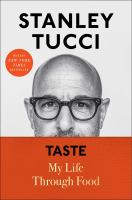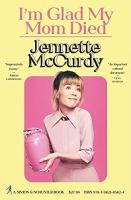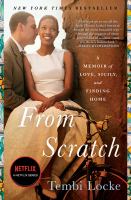The Matchmakers welcome new Matchmaker Lisa Gordon!
Lisa writes:
Taste: My Life Through Food by Stanley Tucci (2021)
 The pungent odor of sautéed onions wafts from the pan I’m shaking. The pan sizzles and spits as I dump in a cup of chopped, homegrown tomatoes. I glance at my e-reader, sitting open in the center of the stovetop, and peruse the next steps of Stanley Tucci’s father’s recipe for Calabrian Tomatoes and Eggs, which was a favorite Friday night supper dish for Tucci’s Italian family, but which I am preparing for breakfast.
The pungent odor of sautéed onions wafts from the pan I’m shaking. The pan sizzles and spits as I dump in a cup of chopped, homegrown tomatoes. I glance at my e-reader, sitting open in the center of the stovetop, and peruse the next steps of Stanley Tucci’s father’s recipe for Calabrian Tomatoes and Eggs, which was a favorite Friday night supper dish for Tucci’s Italian family, but which I am preparing for breakfast.
Tucci’s descriptions of his family’s meals—and the accompanying recipes, should reading about those meals entice your taste buds—is one of the many reasons my favorite memoir of the past year is Tucci’s Taste: My Life Through Food. Tucci takes readers on a tour of his upbringing by focusing on the meals prepared by his Italian family. His comic interchanges with relatives about how, when and why to serve certain recipes—and which condiments are prohibito–elicit out-loud laughter. The dialogue he uses to illustrate the oddball conversational patterns of his old-world parents and grandparents is also priceless, as are the descriptions he includes of the barnyard of animals and the large garden of tomatoes his grandparents kept in their suburban Westchester County, New York, home.
But it may be his accounts of life (and food) on movie sets—and the alternating exquisite and disastrous catered or purchased meals he’s encountered as an actor shooting films on foreign soils—that may be the most intriguing section of the book. The story of a Julie and Julia film crew who were certain that a particular Italian sausage would be delicious but were proven miserably wrong is just one example of the behind-the-scenes experiences that Tucci treats his fans to. His delight at showing Hollywood elites such as Meryl Streep making terrible gastronomic mistakes—all while a set of sniggering and knowing waiters watch them—is pure comic gold.
His memoir isn’t all lighthearted, however: Tucci, who values dining as much as he does acting—was threatened with the loss of his ability to enjoy food due to a bout with oral cancer, which left him terrified for his taste buds as well as his acting career. He also touches on the loss of his first wife to breast cancer, but focuses that section not on his grief but on the culinary arguments the couple had concerning an Italian turducken-like dish called Timpano that he loved to make for Christmas dinner but she abhorred. Turns out his second wife shared his first wife’s disgust with Timpano, much to his chagrin.
But it’s ultimately the recipes Tucci shares and the descriptions of where and how he encountered those recipes that is most compelling and enjoyable about this memoir. I didn’t experience a moment of boredom during this delightful romp through Tucci’s culinary life. The experience was over far too soon, and not long after finishing Taste: My Life Through Food, I read it again—just to savor its delicious aroma.
 I’m Glad My Mom Died by Jennette McCurdy (2022)
I’m Glad My Mom Died by Jennette McCurdy (2022)
Child star Jennette McCurdy has suffered her share of blowback for the daring and some claim tasteless title of her memoir. But throughout this account of a childhood spent pleasing a stage-struck mother, who pushed McCurdy into an acting career she never wanted and never truly enjoyed, the affection the iCarly star felt for mom Debra shines through—although it is often equaled by the longing McCurdy describes for a parent who might value her spirit instead of the fame and money she could bring to her family.
McCurdy’s story alternates between comic retellings of her days on the set of the two Nickelodeon hit series she starred in, iCarly and Sam & Cat, and poignant accounts of the way her mother manipulated, pushed, and controlled her in order to assure her success as a child actress. McCurdy dishes up plenty of gossip about her co-stars, including the prior-to-world-famous version of Ariana Grande, who is clearly not on McCurdy’s favorite-persons list. McCurdy never pushes the cattiness too far, however, which is admirable given that she was performing under stupendous amounts of pressure.
Yet it’s the relationship between McCurdy and her mother that is the linchpin of the book. McCurdy inhabits her younger, childhood self exquisitely, capturing a little girl’s absolute trust in her parent, even when the parent is, from the reader’s point of view, being manipulative and cruel. The skill McCurdy exhibits in conveying how her child-self adored her mother makes the book much more readable than most tell-all child abuse memoirs. She successfully withholds judgment in regard to Debra’s worst behaviors, allowing us to experience Debra as McCurdy herself did—as simply a Mom who wanted the best for her little girl.
It’s not until the latter half of the book that McCurdy begins to understand that her mother was not necessarily acting in her daughter’s best interest. It’s then that McCurdy focuses on her experience of healing from an abusiveness she didn’t even realize she had undergone. McCurdy’s body image issues and drug addictions eventually informed her that something was wrong with her upbringing. Most horrifically, McCurdy comes to the realization that Debra pushed her into acquiring eating disorders to ensure she would remain slim and small enough to win child roles well into her teen years. McCurdy battled those eating disorders for years, well beyond Debra’s 2013 death due to cancer.
Despite Debra’s obsessive and controlling nature, McCurdy’s memoir successfully resists mom-bashing throughout. Instead, we continually sense that McCurdy managed to love her mother despite Debra’s abusiveness, and in the end was able to acknowledge that abusiveness and heal from it without rejecting Debra entirely. Instead, McCurdy’s book conveys a sense of implicit forgiveness towards Debra—a refreshing difference in a genre that often focuses on blame games.
 From Scratch: A Memoir of Love, Sicily, and Finding Home by Tembi Locke (2019)
From Scratch: A Memoir of Love, Sicily, and Finding Home by Tembi Locke (2019)
Back to Italy we go with Tembi Locke, who is perhaps less well known than Stanley Tucci or Jennette McCurdy, but has appeared in many television series, most memorably as Dr. Grace Monroe on Syfy’s series Eureka. While studying in Italy as a Wesleyan University undergrad, Locke met Sicilian chef Saro Gullo—a man with the heart of a poet and the talents of a culinary artist. Gullo introduced her to both love and Sicilian cuisine simultaneously, sweeping Locke off her feet. Soon the two were inseparable, with Gullo following Locke to the U.S. and eventually marrying her.
The story is constructed as a series of flashbacks, and it’s no spoiler to let you know that Gullo’s tragic death from a rare cancer at the age of 42 was the impetus for Locke’s book. In fact, the book opens after Locke has returned to Sicily to honor her husband’s last wish: to bury some of his ashes in his home country. The narrative alternates between Locke’s and Gullo’s 17-year love story, which began with a momentous meet-cute on the streets of Florence when Locke was just 20, and the subsequent tale of Locke’s journeys to Italy to find hope and healing after Gullo’s death with his Sicilian family in his hometown.
We learn that the early days of Gullo’s and Locke’s marriage was marred by his family’s complete rejection of the marriage as well as his father’s disappointment in Saro’s life choices. The fact that the young man chose to abandon his family’s farming lifestyle and move away from rural Italy to follow his dream of becoming a chef angered his traditional and conservative father, who forbade the rest of the family from contacting or seeing Gullo for many years. It didn’t help that Saro married across ethnic and racial lines, as Tembi was a black woman from Texas pursuing an acting career that the conservative Gullo family didn’t understand or approve of. In fact, not a single one of them attended the couple’s wedding.
In alternating flashbacks/flashforwards, we learn that Gullo and his father eventually reconciled and that following Gullo’s death, Locke and their adopted daughter, Zoela, returned to Sicily for three summers to live with Gullo’s mother, also recently widowed. Both Gullo’s family and his entire hometown learn to embrace Locke during these summers as one of their own, allowing Tembi and young Zoela to find solace and peace and granting Locke the courage to recall, with warmth and tenderness, the romantic story of her and her husband’s love.
Throughout the memoir, Saro’s and his mother’s cooking looms large, becoming (much as in Tucci’s memoir) a kind of glue that cements family ties and invites Locke and Zoela to eventually partake of the Sicilian family’s affection. However, unlike in Tucci’s memoir, which incorporates recipes into the narrative, Locke places the recipes for the dishes she mentions at the tail end of the narrative, as a separate collection. This choice has the benefit of making the recipes easier to access, but it does weaken the ties between where the dish is mentioned in the narrative and its full ingredients and details.
Nonetheless, Locke’s story of love, grief, hope and reconciliation—recently adapted as a Netflix limited series–is a wondrous tribute to her late husband and a healing memoir of losing love and finding it anew in the least expected places.


